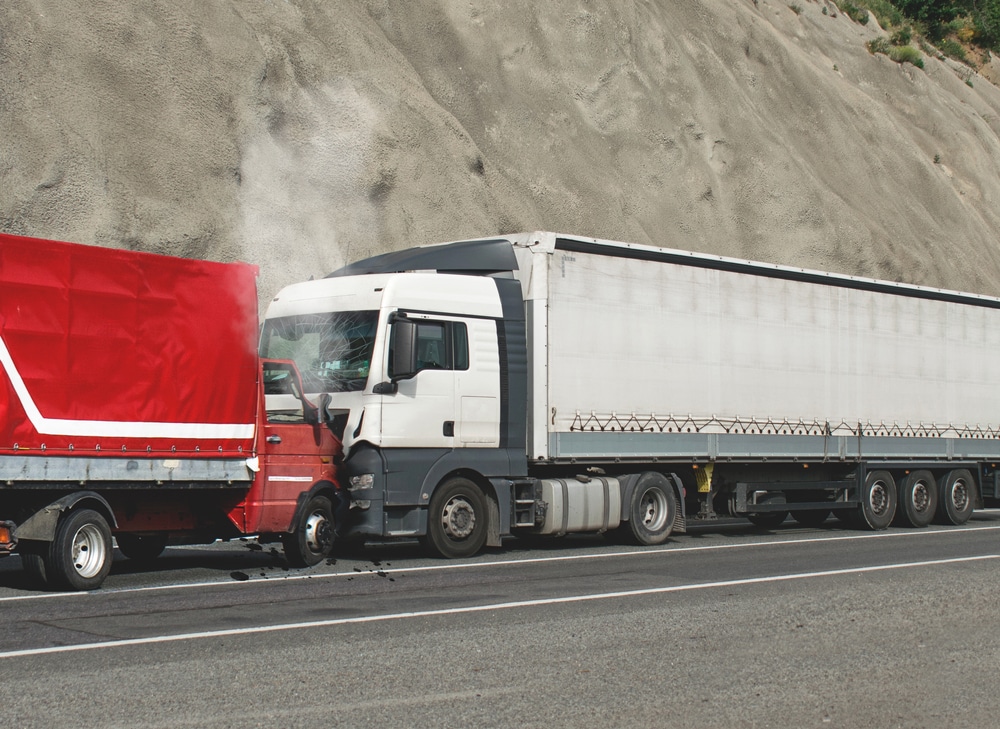Our van accident lawyers in Texas can help you get the compensation you deserve for your injuries so you can move forward.
Hear from Our Satisfied Clients
Why Hire Our Texas Van Accident Lawyers?
Choosing a personal injury lawyer is not a decision you should make lightly. It’s vital to choose an attorney you trust to fight for justice and negotiate a fair settlement or make the best case in court.
Our van accident lawyers understand how difficult it can be to find the right law firm for you.
That’s why, at Patino Law Firm, we do things a little differently.
We’re a veteran-owned personal injury firm. Founder Dr. Louis Patino has decades of experience in an impressive career path that has taken him through the medical and legal fields. Before embarking on a career in law, Dr. Patino served as a U.S. Army Combat Medic for the 10th Mountain Division during the Gulf War era and practiced as a licensed chiropractor. Today, he uses his educational and personal experience in both fields to offer a unique perspective on personal injury law and empathize with victims of accidents with severe injuries.
We offer a personal approach. Right from the moment you book a no-obligation case review through to negotiating your settlement or taking your case to trial, you’ll meet directly with your dedicated van accident lawyer. They will be your point of contact and will always be there to update you on your case and answer any questions you might have.
We’ve secured millions of dollars in settlements for our clients. We’ve secured six-figure-plus settlements for our clients for a range of accidents, including van accidents.
We can help you get access to the best medical care. Evidence is the cornerstone of any successful van accident claim, and the burden is on you to provide it. That’s why we make sure our clients get the best medical care for their injuries. We will discuss your case with your doctor and, if necessary, can refer you to a specialist for expert treatment. We can also help you delay payment for medical treatment until after you receive a settlement, meaning you’ll never be left with expenses you can’t afford.
You don’t pay unless we win. Our Texas van accident lawyers work on a contingency basis, so you won’t pay a cent until we win your case.
What Are the Most Common Van Accident Injuries?
Because of the sheer size and weight of vans, a collision with a smaller vehicle can be catastrophic. Often, they cause moderate or severe injuries, including:
Fractured bones
Bruises and sprains
Cuts and lacerations
Burn injuries
Internal organ damage
Post-Traumatic Stress Disorder
Spinal cord injuries
If you’ve been injured in a van accident, our van injury lawyers in San Antonio, McAllen, and Odessa, Texas, can determine if you have a claim and help you recover the compensation you deserve.
What Are the Common Causes of Van Accidents?
The common causes of van accidents are similar to the causes of semi-truck accidents. And, like truck accidents, many van accidents are preventable.
This is technically a type of accident, but a van rolling over can be the catalyst of a devastating accident, causing a collision with oncoming traffic.
Vans and SUVs have a high center of gravity, which means they’re more likely to tip over if they’re not loaded correctly. It only takes a sharp turn or sudden evasive move to throw off the balance and cause the driver to lose control.
To avoid rollover accidents, van drivers must understand the weight distribution of their vehicles.
Van weight comprises three categories:
- Gross Vehicle Weight Rating (GVWR): How much the van is allowed to weigh.
- Gross Combined Weight Rating (GCWR): If the van is towing a trailer, the GCWR is how much both are allowed to weigh combined.
- Gross Axle Weight Rating (GAWR): How much weight is allowed on each axle. This ensures weight is evenly distributed throughout the vehicle and prevents too much strain on either the front or rear axle.
Often, the GAWR will be higher than the GVWR, as the GAWR is how much weight the axles can take. However, just because they can tolerate more weight does not mean a van driver should overload the van beyond the Gross Vehicle Weight Rating.
These weights vary by van type and are shown on the driver’s seat base. There will also be a label on the driver-side doorjamb that tells drivers the total allowable weight, including fuel, cargo, and passengers. Drivers may forget the weight includes everything inside the vehicle — not just the cargo it’s carrying — which can tip the total weight beyond its maximum limit.
Just like uneven weight distribution can cause a rollover van accident, overloaded vans can result in them too. Heavy vehicles can hinder braking and steering, affecting a driver’s ability to control their vehicle safely.
Whether a van driver is delivering goods or driving a non-commercial vehicle and wants to get to their destination faster, they may drive too quickly, sometimes beyond the legal limit.
Speeding means that if there’s a hazard — whether a physical hazard on the road or another driver ahead braking abruptly — the van driver has less time to react and may drive straight into the hazard or slam the brakes, skid across the road, and collide with traffic.
Distracted driving is one of the leading causes of all motor vehicle accidents. Distracted driving is anything that takes a driver’s attention off the road — and all it takes is one second to cause a crash. Having a quick sip of water while driving or talking to other passengers may seem innocent enough, but these activities cause severe accidents across the US every year.
Driver fatigue is another common cause, and it’s especially prevalent among commercial van drivers who work long hours. If a driver feels tired while behind the wheel, they are obligated to pull over and rest before resuming their journey. If they don’t, and they cause a van accident, they can be held liable for putting the safety of others on the road at risk.
Driving under the influence is common among drivers of all motor vehicles, from cars to semi-trucks. When an individual is driving a van for work, they may resort to taking stimulants like amphetamine to help them stay awake. However, such stimulants compromise the attention span and reduce reaction time, which can cause a deadly accident.
Even legal drugs like prescriptions and over-the-counter medications can cause drowsiness, so if a driver takes these, they must be prepared to stop driving if fatigue sets in.
If a van driver works for a delivery company or other employer, the company is required to conduct regular maintenance to ensure their fleet of vans is safe and road-worthy. If a fault isn’t detected and causes a van accident that injures you, you may hold the company responsible.
There’s little anyone can do about inclement weather such as wind, snow, and heavy rain, but it should influence how a van driver acts on the road. Bad weather conditions can affect visibility and make slick roads hard to navigate, but van drivers should take precautions, such as driving slowly to prevent skidding. If a driver fails to take care while driving and causes an accident, a van accident lawyer can hold them accountable for their recklessness.
If part of a van is faulty and this defect causes an accident, you might be able to claim compensation from the manufacturer. Unfortunately, this is one cause of van accidents that can’t always be prevented, as many don’t know a van part is faulty until it’s too late. Some of the most commonly affected van parts are:
- Brakes
- Steering mechanism
- Tires
- Reflectors
- Horns
- Windshield wipers
- Rear mirrors
- Hinge
- Fuel tank
- Engine
We rely on road signs to tell us how fast we can drive when there’s a turn, intersection, or school zone up ahead, and more. If these signs are obscured — or missing entirely — it can cause a car accident.
What Compensation Can a Texas Van Accident Lawyer Help You Get?
A van accident can leave you with severe injuries that prevent you from working or require extensive medical treatment.
This can be a scary time, especially when you need to provide for yourself and your family.
Fortunately, you don’t have to figure it all out on your own.
You may be entitled to file a personal injury claim to compensate you for your injuries and expenses.
Our McAllen and San Antonio van accident lawyers can help you file for compensation if you’ve been injured in an accident.
Want to find out how much compensation you could be entitled to? Try our quick and easy personal injury calculator.
Who Is Liable for a Van Accident?
In most road accidents, the driver who caused the accident is typically responsible. But in a van accident, multiple parties may be liable. While this makes van accident claims complex, it may give you additional avenues for pursuing compensation. The parties that may be at fault are:
The Van Driver
If your van accident was caused by the driver’s reckless or negligent behavior — such as speeding or driving while fatigued, distracted, or under the influence — you may be able to hold them responsible for your injuries. Driver error is the most common cause of all motor vehicle accidents.
The Van Driver’s Employer
If the van driver is acting in the scope of their employment when they cause an accident, such as making a delivery, you may be able to claim compensation from their employer. This is often a viable route if the company failed to conduct proper checks on both the vehicle (to ensure it was safe to go out on the road) and the van driver (to ensure they have an up-to-date license and no traffic citations).
The Van Manufacturer
If a defective van part is responsible for your accident, whether a blown tire or brake malfunction, you may be able to recover compensation from the manufacturer.
The Cargo Company
If a third-party organization is responsible for loading cargo onto your van and it exceeds the Gross Vehicle Weight Rating or is unevenly distributed across the axles and this causes an accident, such as a rollover, you may be able to hold the company liable in a personal injury claim.
The Maintenance Company
If you work for a company that contracts a maintenance company to service your van and it fails to replace worn parts or does not fix identified faults — and you can prove a mechanic was aware of it — you may have a claim.
Locations We Serve
Our Texas accident attorney has successfully recovered maximum compensation for injured individuals and their families all over the state, from the Rio Grande Valley to the Permian Basin.






